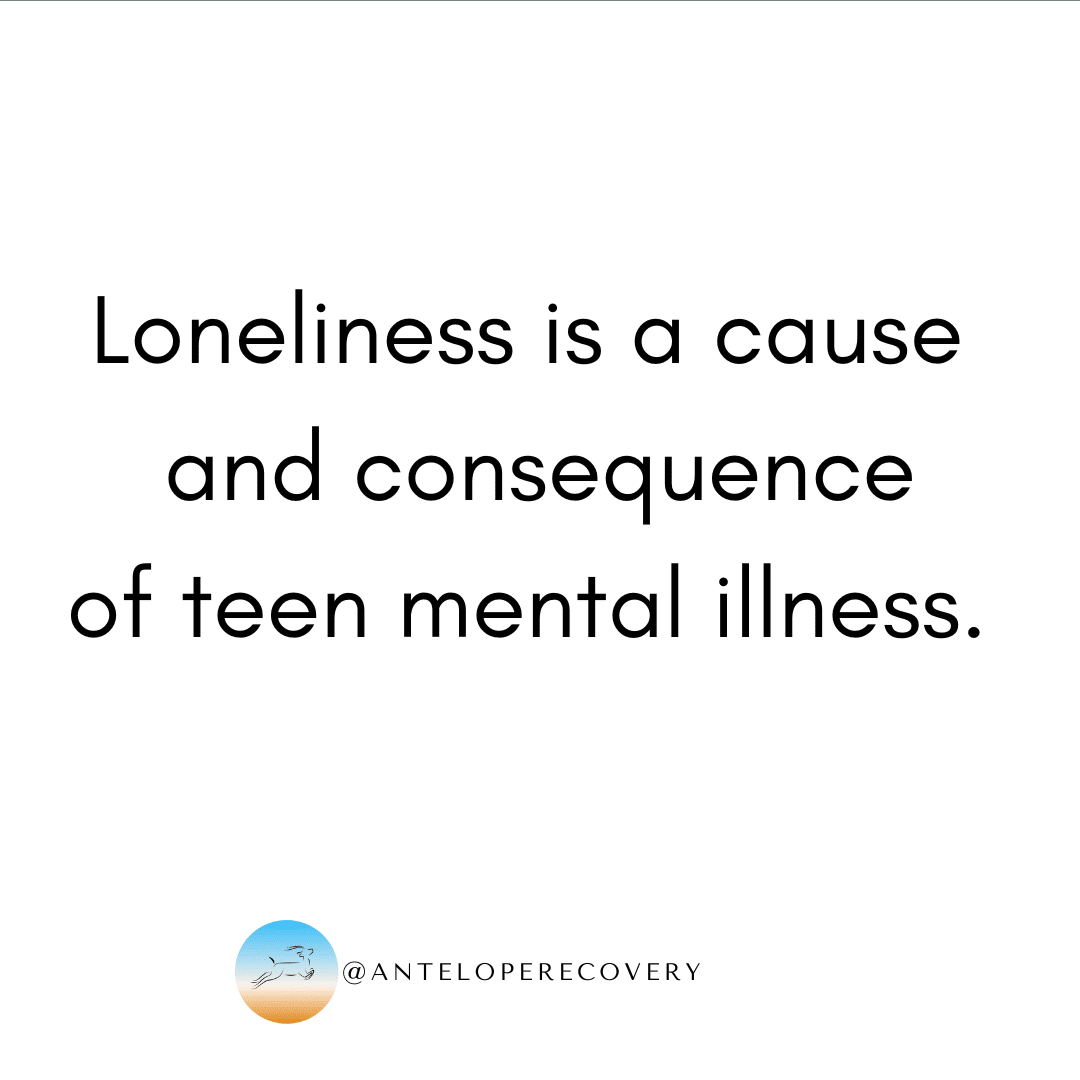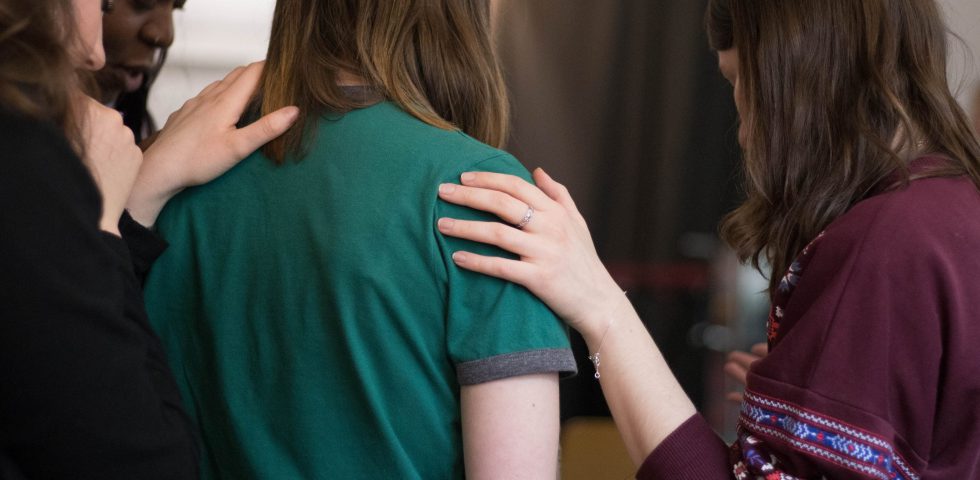Teens need authentic connection.
There is ongoing research on the importance of peer connection in preventing and treating mental illness. Loneliness is both a known cause and consequence of mental illness. So much so that loneliness is a risk factor for early mortality, surpassing obesity, smoking, and alcohol abuse. The good news is that relationships and healthy attachment can be curative. Antelopes’ teen groups focus on relationship and communication skills that empower our teens and parents to build and deepen healthy relationships. We know that mental illness can be isolating and inescapably lonely. Through our group therapy programs, we face that reality head-on and teach our clients how to build and deepen relationships with others.

Teens specifically relate to loneliness and perceive the feeling of being lonely differently than adults do. Unique properties of adolescence carry a special risk for perceived social isolation. These include (but are not limited to) developmental changes in friendships, identity exploration, cognitive maturation, developmental changes in social perspective-taking, and physical maturation. Teens often need specific support with developing social skills – and we’ve found groups to be the best technique to facilitate the growth and maturity of those skills.
Connection heals by…
- We have found that oxytocin and vasopressin are incredibly important neurotransmitters involved in the recovery process.
- We have found that social connection during treatment, such as being in love, can reduce symptoms and intensity of symptoms.
- Knowing that if you were in trouble, you could call someone in the middle of the night who would “have your back” significantly predicts the longevity of life.
Often, people choose to start therapy only with a one-on-one therapist without considering joining a group with peers or other people struggling or wanting to grow. It might feel intimidating to join a group with people you don’t know, but there are programs and professionals out there who can help guide you and with whom you’ll deeply connect.
What is group therapy?
Group therapy is a type of psychotherapy in which a therapist works with multiple clients simultaneously in a group setting. It’s a common type of therapy used within mental health treatment programs. There are many different types of group therapy options. All of these can also be attended virtually!
- Modality specific groups such as:
- EMDR groups
- DBT groups
- CBT groups
- Emotional and social development building
- Process groups
- Adventure therapy groups
- Art therapy groups
- NA, AA, or Alateen groups
- Support groups for grief, divorce, illness, etc.
If you’re thinking about joining a group, make sure to ask these questions:
- What are the goals of the group?
- What is the size of the group?
- What is the age range of the group?
- What is the group’s orientation (i.e., is it open or closed)?
- What is the focus of the group?
- What is the gender mix of the group?
- What is the schedule? (i.e., how frequently does the group meet and for how long?)
Even though talking about your thoughts and feelings in a group setting might seem intimidating, group therapy provides wide-ranging mental health benefits that individual psychotherapy does not. At its core, groups help members feel comfortable with being vulnerable, navigating their emotions, and having honest, direct conversations with others.
What does group therapy usually look like?
During a group, usually, one or more facilitators lead a group of 5–15 clients. Typically, groups meet one or two times a week. Some clients attend individual therapy in addition to the group, while others only participate in the group. In an intensive outpatient program, patients attend multiple groups each week.
Group facilitators might be active in the group, helping group members develop skills or asking questions, or may only intervene in the group conversation to keep the group moving in a productive direction. Some facilitators encourage a free-form dialogue during group sessions, while others have a specific plan for each group session.
What if my teenager does not want to attend a therapy group, but I know they would benefit from it?
It is normal for teens not to want to attend groups. Often, during the first session, they will tantrum, eye roll, manipulate, and do whatever they can to get out of attending the group. From screaming to silent treatments…we’ve truly seen it all. Most teens do this for a few reasons.
1, Rebellion: It’s normal for teens not to want to do anything that their parents or any authority suggests. This anti-authority attitude is a normal part of the individuation process for many teenagers. For setting boundaries with rebellious teens, we recommend utilizing choices and limits with your teen, as outlined in this blog.
2. Manipulation or tantrums usually gets them what they want. If you reward tantrums or manipulation, your teen will likely continue to engage in those behaviors. The easiest way to transition out of these dynamics is to no longer reward your teen for engaging in manipulative or tantruming behaviors.
3. Anxiety and fear: Your teen may be afraid of joining a new social group. Your teen’s internal dialogue may sound like… What if the people don’t like me? What would that mean about me? What if I’m really unlovable by my peers? If your teen is afraid, we recommend having the teen meet the instructor before group, and ask the instructor if there’s any way your teen can see the space before attending group.
Teen group facilitators are going to be very used to all of these different reasons why a teen may not want to be at group, and they will be able to support you and your teen. If you are worried about resistance, come up with a strategy with the group facilitators to support your teen in taking these challenging steps forward. It’s possible that the group facilitators will be able to support you, or they may recommend an alternative support structure, such as family therapy or individual therapy, before giving group therapy a try.
Group therapy with Antelope Recovery
The power of peer support, shared experiences, and a safe, non-judgmental space cannot be underestimated. At Antelope Recovery, we understand the significance of group therapy in the context of teen mental health. Our numerous teen support groups provide a platform for adolescents to connect, share, and grow together, under the guidance of our experienced professionals. If you’re concerned about your teen’s mental health or believe they could benefit from the positive impact of group therapy, don’t hesitate to reach out to Antelope Recovery. Together, we can help your teenager on their path to recovery, resilience, and a brighter future.


